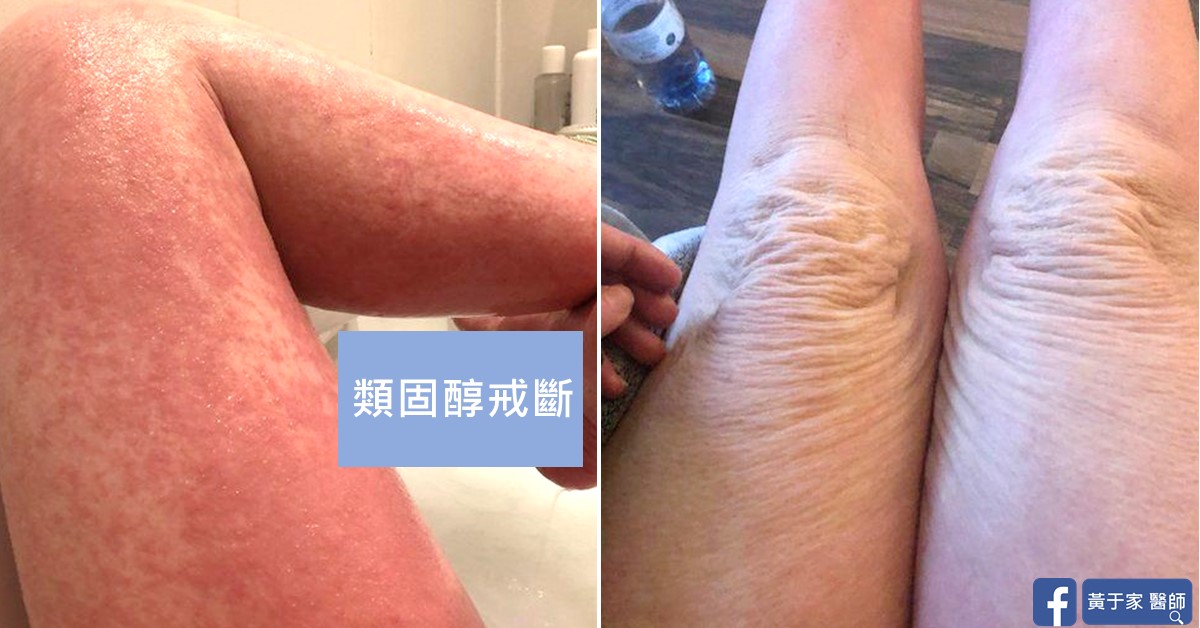
類固醇戒斷反應逐漸被正視,台灣衛服部已於 2022 年 6 月 1 日發函台灣皮膚科醫學會,主旨闡釋局部皮質類固醇藥膏可能導致類固醇戒斷,詳情請見這裡。
而類固醇戒斷在英國的情況,英國國民保健署、英國皮膚科醫學會主席的看法,和當地類固醇戒斷患者的心路歷程,可見此篇 BBC 新聞報導。

而類固醇戒斷在英國的情況,英國國民保健署、英國皮膚科醫學會主席的看法,和當地類固醇戒斷患者的心路歷程,可見此篇 BBC 新聞報導。
「在英國肯特郡的這兩位女士,先前都曾長期外用類固醇藥膏,而在停用之後,皆出現嚴重的類固醇戒斷反應,皮膚脫屑、滲裂、流湯流水以及反覆感染。

這兩位主人翁目前皆已停用類固醇藥膏多年,卻還沒完全痊癒,她們力勸大眾該謹慎看待類固醇藥膏的使用。
其中一位現年 31 歲的類固醇戒斷患者 Aramidé Onashoga,她在大學時因為濕疹而開始外用類固醇,但她發現一旦停用類固醇,皮膚就會腫脹、流湯流水,脫皮,脆弱不堪,反覆感染,患者自訴就像皮膚最外面的那層消失了一樣。
另一位患者 Bethany Jones,則自小就因為濕疹,這幾十年一直斷續使用外用類固醇,直到在一年前,因為類固醇藥膏不再有效了才停用。
至今她已經停用類固醇達 14 個月,但她描述自己目前的皮膚,絕大部分看起來都還像是燒燙傷般脆弱,紅腫、脫屑,只要稍加拉扯,皮膚就會裂開,她因此長達半年,無法踏出家門。
英國國民保健署表示,外用類固醇對於皮膚疾患雖然相當有效,但是停用類固醇後的戒斷反應,有時會相當嚴重。
英國皮膚科醫學會主席 Dr. George Moncrieff 則表示受苦於類固醇戒斷的患者,事實上遠比目前已經確診的來得多,他認為約有十分之一的患者會在停用類固醇之後出現戒斷的不適,因此皮膚科醫師該對類固醇的使用更加謹慎,並對因類固醇戒斷而受苦的患者多些同情心。
依他所見,唯一能緩解類固醇戒斷不適的有效方法是使用更大劑量或更高強度的類固醇,但這只是暫時的緩解,長遠來看,這樣的方式如同飲鴆止渴,只是讓情況變更糟。
英國皮膚科醫學會主席還提到,患者的確可以選擇直接停用外用類固醇,但這樣的方式,會使類固醇戒斷的不適反應相當劇烈,且這樣的不適可能長達數個月。
報導中的這兩位類固醇戒斷患者,目前都改用全人醫療來照護她們的皮膚,而非先前只外用類固醇藥膏。
諸如做過敏原測試了解引發自身過敏的東西有哪些,戒酒,戒麩質,斷絕使用化學除臭劑以及洗衣粉,並使用濾水器過濾用水,盡可能減少對皮膚的刺激,並佐以潤膚劑以及營養補充品。
經歷類固醇戒斷的折磨,患者衷心感嘆:『如果可以選擇,我寧願濕疹終生不癒,也不願經歷類固醇戒斷的痛苦』。」
寧可濕疹終生不癒,也不願經歷類固醇戒斷的痛苦
報導內所提到的,在門診中一點都不罕見,並不因為地域或人種而有所不同,類固醇戒斷以及類固醇不當使用造成的副反應,實在不容小覷。
英國皮膚科醫師,對於類固醇戒斷的看法,請見這裡。
Aramidé Onashoga and Bethany Jones are urging others to be aware of risks of steroid cream withdrawal.Two women who had extreme withdrawal reactions after using steroid creams to treat skin conditions are speaking out to warn others of the risks.
Aramidé Onashoga and Bethany Jones, from Kent, are still continuing their recovery, years after stopping topical corticosteroids.
They had Topical Steroid Withdrawal (TSW), and experienced skin shedding, splitting and infections.The chair of the Dermatology Council said TSW is under-diagnosed.
Aramidé Onashoga experienced swelling, skin shedding and infections.
Miss Onashoga, from Chatham, initially started using the cream at university, after comments were made about her eczema.
But when she came off the treatment, parts of her body swelled.
"It was like the top layer of my skin wasn't there. My skin would leak a lot of fluid and I would get repetitive infections," the 31-year-old said.
Bethany Jones, from Tunbridge Wells, used the cream on and off since she was a young child to treat her eczema.
She was prescribed it until 2020, but she came off it after it stopped being effective.
Bethany Jones photographed her physical reactions from coming off the steroid creams over 14 months.
She said:"I looked like I was burnt over about 95% of my body.
"My skin was shedding, it was oozing and splitting. I'd move and my skin would tear."
She was unable to leave the house for six months, she said.According to the NHS, topical corticosteroids are an effective treatment for skin disorders, but withdrawals can "sometimes" be severe.
Dr. George Moncrieff said the profession should sympathise with TSW sufferers.
Dr. George Moncrieff, of the Dermatology Council, said TSW could affect as many as one in 10 patients.
He said:"The profession does need to alert itself to this condition.
"The only thing that seems to calm it down is putting more steroid on, but that makes it even worse in the longer term, so it's a vicious cycle.
"They can go cold turkey, but it can last many months and be pretty horrible."
Bethany Jones said her skin would rip and tear, and then began to peel away.
Both women are now managing their conditions holistically.
Miss Onashoga said:"The first point of treatment should be allergy testing to know and understand our triggers."
Miss Jones now avoids alcohol, gluten, certain deodorants and washing powders to avoid flare ups. She uses emollients, takes supplements and has a water filter on her shower.
She added:"I would much rather have lived with my eczema symptoms for a lifetime than gone through this."


